New Year Movies. Films reviewed: Babylon, Broker
Hi, this is Daniel Garber at the Movies for culturalmining.com and CIUT 89.5 FM.
This week I’m looking at two new movies to bring in the new year. There’s an abandoned baby in Busan, and excessive abandon of 1920s Hollywood.
Wri/Dir: Damien Chazelle (La La Land, Whiplash)
It’s a hot day in Santa Ana, near LA, in the 1920s. Manny (Diego Calva) has a strange job. He has to get an elephant through the desert to a mansion in time for a huge Hollywood party that night. There he meets Nellie LeRoy (Margot Robbie) an aspiring young actress who claims to be a movie star. She’s never actually been in anything yet but she says in Hollywood if you say you’re a star you are a star. The doorman is unimpressed but Manny, now in a sweaty tux, gets her through the door. Inside it’s a jazz-filled mayhem of half-naked dancers snorting cocaine as they prepare for their next writhing orgy. The guest of honour is Jack Conrad (Brad Pitt), Hollywood’s top moustachioed movie star.
Manny stays relatively sober but Nellie goes whole hog, successfully transforming herself into a wild-child party animal. Manny saves the day when he manages to sneak a dead body out of the party on behalf of the studio, without the gossip rags — including Photoplay’s notorious columnist (Jean Smart) — noticing. A woman died in a back room with a Fatty Arbuckle lookalike. By morning, both Manny and Nellie are invited to work on location on some movies being shot there; she as a starlet and he as a fixer, helping out in emergencies.
The movie follows the three of them — Manny, Nellie and Jack — as they make their way up and down Hollywood’s precarious ladder. Nellie is a smash hit — she can cry on cue in a tragedy, and minutes later turn herself into a laughing floozie in a western bar. Manny works behind the scenes, doing the dirty things the top producers shy away from. Jack is still the top star, but is gradually slipping at the box office, acting in one flop after another. has a meteoric rise but faces trouble when the talkies arrive. Manny makes his way to executive level, but likes himself less and less. Will Jack find a wife who loves him? Can Nellie lose her Jersey accent in time for the talkies? Which one of them will survive the dog-eat-dog world of the movie industry?
Hollywood’s precarious ladder. Nellie is a smash hit — she can cry on cue in a tragedy, and minutes later turn herself into a laughing floozie in a western bar. Manny works behind the scenes, doing the dirty things the top producers shy away from. Jack is still the top star, but is gradually slipping at the box office, acting in one flop after another. has a meteoric rise but faces trouble when the talkies arrive. Manny makes his way to executive level, but likes himself less and less. Will Jack find a wife who loves him? Can Nellie lose her Jersey accent in time for the talkies? Which one of them will survive the dog-eat-dog world of the movie industry?
Babylon is a very long but frenetically-paced movie about the early days of the motion picture industry. It recreates a version of that world with exquisite attention to detail — the music, the costumes, and incredible reenactments of the filming of war scenes and dance numbers using hundreds of extras. It gives you an uncommon, behind-the-scenes look at the silent movie era. Scenes in Babylon melt one into the next with cameras that lead you through tunnels, up staircases, from room to room in seemingly endless long shots. The story is part myth, part history. I’m guessing Chazelle found his inspiration in books like Kenneth Anger’s Hollywood Babylon, about the excessive and scandalous depravity that rocked the industry before the restrictive Hays code came into effect in the mid 1930s. He frequently quotes other famous  movies set in LA about the movies themselves, everything from Sunset Boulevard to A Star is Born, to Singin’ in the Rain. (See how many you can spot.) And the over-the-top acting, especially Margot Robbie, is a lot of fun.
movies set in LA about the movies themselves, everything from Sunset Boulevard to A Star is Born, to Singin’ in the Rain. (See how many you can spot.) And the over-the-top acting, especially Margot Robbie, is a lot of fun.
Is Babylon a good film? I had trouble identifying with the main characters — they all seem like pawns in the director’s hands as he tells his epic story. It features some non-white, non-conventional characters, from a female movie director, to a lesbian singer from Shanghai, and a black Jazz musician showing off his trumpet skills. Ironically they all seem to be inserted more to demonstrate the director’s commitment to historical diversity rather than as central characters. But it’s not really about the characters, it’s about the city of Los Angeles. Chazelle puts in lots of things meant to shock — nudity, defecation, urination, projectile vomiting, even characters who die as punchlines to jokes — that don’t quite fit. But all that didn’t stop me from loving the movie-making on display.
If you’re a movie-lover, this epic deserves to be seen.
Wri/Dir: Kore-eda Hirokazu (Shoplidters, After the Storm, Our Little Sister, Like Father Like Son)
It’s nighttime at a church in present-day Busan, South Korea. A young woman, a sex worker named So-young (Lee Ji-eun) is carrying her newborn infant which she leaves in a “baby box”, a small door where unwed mothers can leave their unwanted infants, knowing that they’ll be taken care of. What she doesn’t realize is there are two men on the other side of the door: Sang-hyun (Song Kang-ho), a younger guy who works at the church; and Dong-soo (Gang Dong-won) a middle aged man who owns a tiny hand laundry shop. Right after So-young leaves, they erase the surveillance video and make off with the infant. Their plan? To sell it to a young married couple with fertility problems and keep the profit. But these two men don’t realize that Detective Ji-Sun (Bae Doona) and her subordinate (Lee Joo-young) are watching the whole thing from their police car parked just down the hill. They’re excited that what they see tonight might solve the baby trafficking case they’ve been working on for a long time. But they can’t prove anything until a transaction takes place.
But nothing is as simple as it seems. After a few days, So-young wants her baby back. She left a note saying the arrangement was only temporary. But she can’t involve the police. So she tracks down the two brokers. Turns out Sang-hyun grew  up in an orphanage, so finding loving parents will spare the baby from growing up within the bleak institution he lived through. And Dong-soo has both monetary reasons — he’s deeply in debt — and personal reasons why this has to go through. So the three of them form an easy alliance of brokers looking for a permanent home for the infant. And when they discover Hae-jin (Lim Seung-Soo) a feisty kid from an orphanage they’re dealing with stowed away in their car, they suddenly become a makeshift family. But how long will it last?
up in an orphanage, so finding loving parents will spare the baby from growing up within the bleak institution he lived through. And Dong-soo has both monetary reasons — he’s deeply in debt — and personal reasons why this has to go through. So the three of them form an easy alliance of brokers looking for a permanent home for the infant. And when they discover Hae-jin (Lim Seung-Soo) a feisty kid from an orphanage they’re dealing with stowed away in their car, they suddenly become a makeshift family. But how long will it last?
Broker is a wonderful, multifaceted movie about love, kinship and makeshift families. It’s also a murder mystery, a romance, a police procedural, and a road movie. Each of the characters has a rich background full of secrets and motives all of which a are gradually revealed. It’s directed by Kore-eda Hirokazu, one of favourite directors who always finds a way to make dramas with unforgettable characters who are deeply flawed but still sympathetic. He made Shoplifters a few years ago, and this one picks up on some of his themes. Kore-eda is Japanese, but everything else in this film is Korean — from the language to the locations and the  fantastic cast. You’ll recognize some of them: Song Kang-ho starred in Parasite, Bae Doona has been in everything from The Host to Cloud Atlas. So Broker is both a Korean movie, and unmistakably Kore-eda. I saw it four months ago at TIFF, but it really is stuck in my head.
fantastic cast. You’ll recognize some of them: Song Kang-ho starred in Parasite, Bae Doona has been in everything from The Host to Cloud Atlas. So Broker is both a Korean movie, and unmistakably Kore-eda. I saw it four months ago at TIFF, but it really is stuck in my head.
I strongly recommend this movie.
Babylon is now playing; check your local listings. Broker opens this weekend in Toronto at the TIFF Bell Lighbox.
This is Daniel Garber at the Movies, each Saturday morning, on CIUT 89.5 FM and on my website, culturalmining.com.
Daniel Garber talks with Ema Kawawada about My Small Land
Edited version
Long version, 日本語 付き
 Hi, this is Daniel Garber at the Movies for culturalmining.com and CIUT 89.5 FM.
Hi, this is Daniel Garber at the Movies for culturalmining.com and CIUT 89.5 FM.
Sarya is a typical Japanese high school girl in her graduating year. She is studying hard to pass her university entrance exams, and hopes to become a school teacher. She likes playing badminton, and hanging with her best friends. And she’s starting to flirt with a guy, Sota, who works with her, part-time, at a convenience store. But her whole life falls apart overnight when her father is turned down for asylum, and all their ID cards are taken away. Sarya and her family are Kurdish refugees, and have been waiting for proper visas since she was just a little girl. But suddenly she’s 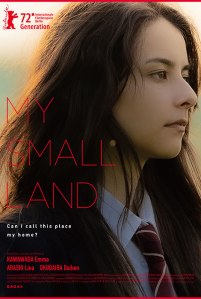 undocumented, can’t travel, can’t go to university, can’t take paid work or even cross the invisible border into Tokyo. What has happened to her small land?
undocumented, can’t travel, can’t go to university, can’t take paid work or even cross the invisible border into Tokyo. What has happened to her small land?
My Small Land is a thoughtful, touching and deeply moving coming-of-age story about a girl’s life in Japan whose identity is called into question. It deals with family, culture, refugees, assimilation, and how a young woman handles a double life as a Kurd in Japan. The film is produced by Hirokazu Kore-eda and written and directed by Ema Kawawada, her first feature. The film premiered at the Berlin Film Festival to great acclaim and opens soon in Canada.
I spoke with Ema Kawawada in Tokyo from Toronto via Zoom.
Interpretor: Aki Takabatake
My Small Land is playing in Toronto at the TIFF Bell Lightbox on Nov 9th and 16th.
Kinship. Films reviewed: Vox Lux, Shoplifters
Hi, this is Daniel Garber at the Movies for culturalmining.com and CIUT 89.5 FM.
The holiday season is a time when families get back together, for good or for ill. So this week I’m looking at two movies about family and kinship. There’s a pair of sisters turned pop musicians, where one holds the scars of a terrible incident; and a makeshift family that rescues a small girl with scars.
Wri/Dir: Brady Corbet
Celeste (Raffey Cassidy) is a god-fearing high school student in Staten Island, New York. She likes music, church and her big sister Eleanor (Stacey Martin) who always looks out for her. But her world turns upside down when a non-conformist kid pulls out a gun in music class, and starts shooting people down. Celeste tries to reason with him; she ends up wounded but not dead. She recovers with a scar on her neck. At the memorial for the mass shooting she performs a song which soon goes viral.
She and her sister are quickly signed to a major label by their manager (Jude Law) and whisked off to Sweden. There they experience the heady brew of extreme wealth, celebrity and  number-one hits. But it also exposes them to the cruel scrutiny of tabloids and paparazzi that accompany celebrity.
number-one hits. But it also exposes them to the cruel scrutiny of tabloids and paparazzi that accompany celebrity.
Still a teenager, she loses her virginity to another musician, tries drugs and alcohol for the first time, and begins a gradual downward spiral toward addiction and paranoia. But she also establishes herself as an international icon, with her sparkling makeup, severe haircuts, and sequined outfits mimicked by devoted fans. She always wears a band around her neck both to hide and commemorate the scars of the shooting.
Years later Celeste (now played by Natalie Portman) plans for a comeback, culminating in a stadium concert back in the hometown she left after the shooting. Now she’s brittle and bitter, addicted to drugs, and full of anger and pain. And she has a daughter (played by Cassidy, the young Celeste) brought up by the more  responsible sister Eleanor. As she works toward the ultimate concert, a disturbing incident hits the headlines. Halfway around the world, fans wearing her distinctive makeup and clothing commit a random act of terrorism. Is she to blame? Will her career crash and burn? And if she performs her stadium show in her home town, will this lead to yet another massacre?
responsible sister Eleanor. As she works toward the ultimate concert, a disturbing incident hits the headlines. Halfway around the world, fans wearing her distinctive makeup and clothing commit a random act of terrorism. Is she to blame? Will her career crash and burn? And if she performs her stadium show in her home town, will this lead to yet another massacre?
My brief description of the film suggests a music biopic crossed with an action movie. It’s neither. It’s actually a visual and audio collage of the impressions of a teenaged girl in the high pressure world of pop music, and the adult who emerges from it. Vox Lux is a short film, and at least a third of it is taken up by music performed on a stage before an actual audience. The music is by  SIA and actually sung by Natalie Portman. The plot is mainly a background for the director’s experiments with sound and image filtered through the cruel world of social networks. Recurring shots of endless tunnels and aerial views of cities give it a hypnotic effect, and the music gives it a haunting feel. Though the movie feels incomplete, I liked the look and sound of it.
SIA and actually sung by Natalie Portman. The plot is mainly a background for the director’s experiments with sound and image filtered through the cruel world of social networks. Recurring shots of endless tunnels and aerial views of cities give it a hypnotic effect, and the music gives it a haunting feel. Though the movie feels incomplete, I liked the look and sound of it.
Wri/Dir: Kore-eda Hirokazu
It’s present day Tokyo. Shota (Jyo Kairi) is a young boy living in an urban paradise. He’s smart, resourceful and brave. He studies at home – where he learns not just reading and writing, but also essential survival skills and the ways of the world. He lives with his grandma, his mom and dad and his big sister Aki,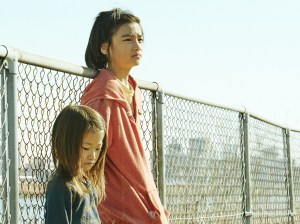 a family brimming with love. They are always there to rescue him from trouble and help him through bad times. They share responsibilities and eat dinner together. No one tells Shota to clean his room or wash the dishes. This is a life rich in traditions, superstitions, and family lore. And there’s lots of time to tell stories, go to the beach, or go fishing.
a family brimming with love. They are always there to rescue him from trouble and help him through bad times. They share responsibilities and eat dinner together. No one tells Shota to clean his room or wash the dishes. This is a life rich in traditions, superstitions, and family lore. And there’s lots of time to tell stories, go to the beach, or go fishing.
Or…
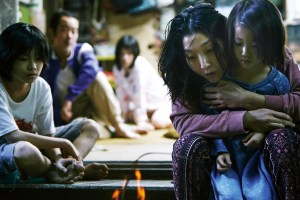 Shota lives in a filthy, ramshackle house, a Dickensian den of petty criminals, thieves and con artists. This so-called family of vaguely-related misfits shoplifts their dinners and daily needs to stay alive. Dad (Lily Franky) works as a casual labourer, Grandma (Kiki Kirin) receives payments from an unknown source, teenaged Aki (Matsuoka Mayu) performs behind glass at a peepshow arcade, and mom, sometimes called auntie or Nobuyo (Sakura Ando) makes do with a parttime job pressing garments in a small factory. Even young Shota helps them all by
Shota lives in a filthy, ramshackle house, a Dickensian den of petty criminals, thieves and con artists. This so-called family of vaguely-related misfits shoplifts their dinners and daily needs to stay alive. Dad (Lily Franky) works as a casual labourer, Grandma (Kiki Kirin) receives payments from an unknown source, teenaged Aki (Matsuoka Mayu) performs behind glass at a peepshow arcade, and mom, sometimes called auntie or Nobuyo (Sakura Ando) makes do with a parttime job pressing garments in a small factory. Even young Shota helps them all by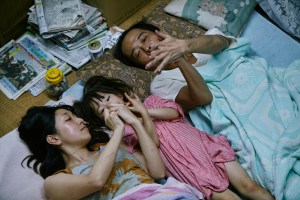 pocketing food and shampoo while dad distracts the clerks.
pocketing food and shampoo while dad distracts the clerks.
But homelife takes a subtle shift with the newest family member.
Yuri (Miyu Sasaki) is a little waif, horribly abused and neglected by her young parents… they always see her staring whistfully through her balcony bars, like a prisoner hoping to be rescued. They adopt her into their family, after discovering scars and burn marks all over her arms.
She immediately adapts to her new life, especially the love, 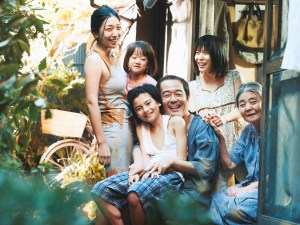 attention and lack of fear she never experiences at home. They ask her if she wants to go home, but she adamently refuses… she likes it better here. But when her case becomes known as a kidnapping, it spells trouble. Can the family survive this a brush with authority? Or will it all come tumbling down? And would government intervention make their lives better or worse?
attention and lack of fear she never experiences at home. They ask her if she wants to go home, but she adamently refuses… she likes it better here. But when her case becomes known as a kidnapping, it spells trouble. Can the family survive this a brush with authority? Or will it all come tumbling down? And would government intervention make their lives better or worse?
Perhaps I’m biased: I’ve interviewed Kore-eda four times, more than any other director, because I love all his films. But in my opinion Shoplifters is a fantastic movie, definitely one of the year’s best. It deals with poverty, nonconformity and precarious lives coexisting within one of the richest cities in the world. It explores what a family really is: is it something designated by law, or could it be a family by choice, where the members designate their own names and roles.
It stars many of his past actors – Lili Franky, and the late Kiki Kirin – and replays some themes from his early films. Our Little Sister was about whether a half-sister can be accepted into a complete family. Like Father, Like Son, where a family discovers their son was switched at birth, explores whether it’s nature or nurture that makes kinship real (Lili Franky plays the “bad dad” in that film.) After the Storm is about a delinquent dad trying to rebuild his family (also co-starring Lili Franky and Kiki Kirin). The Third Murder, a courtroom drama, deals with an accused murderer and his role as a surrogate parent to a high school girl. And in Nobody Knows, there’s a family made up of abandoned kids living in a highrise in central Tokyo.
Shoplifters (or Shoplifter Family, the more accurate Japanese title) is a culmination of all these films, a distillation of all their best elements.
It’s also exquisitely laden with relics of an older Japan – filled with glass bottles, printed cotton, paper calenders, snow men and fishing trips – that impart a soft, glowing light to all the scenes.
Detailed and nuanced, I strongly recommend Shoplifters to all.
Vox Lux and Shoplifters both open today in Toronto; check your local listings.
This is Daniel Garber at the Movies, each Friday morning, on CIUT 89.5 FM and on my website, culturalmining.com.
Daniel Garber talks with Hirokazu Kore-eda about After the Storm at #TIFF16
 Hi, this is Daniel Garber at the Movies for culturalmining.com and CIUT 89.5 FM.
Hi, this is Daniel Garber at the Movies for culturalmining.com and CIUT 89.5 FM.
Ryota is a middle-aged man, separated from his wife and son, and estranged from his mother. Once a rising star in Japan’s literary world, his one novel gathers dust in second-hand bookstores. He hasn’t published anything for 15 years. Instead he earns his living at a skeezy detective agency,  taking incriminating photos and selling them back to the victims caught on film. What money he does earn goes not for rent or child support but directly to the racetracks. A death in the family brings all the players in his life — his mother, his ex-wife Kyoko and Shingo his son – together again, in his childhood home. But clouds are gathering as a typhoon approaches. Will they still be talking… after the storm?
taking incriminating photos and selling them back to the victims caught on film. What money he does earn goes not for rent or child support but directly to the racetracks. A death in the family brings all the players in his life — his mother, his ex-wife Kyoko and Shingo his son – together again, in his childhood home. But clouds are gathering as a typhoon approaches. Will they still be talking… after the storm?
After the Storm is the name of the newest film by festival favourite and award-winning filmmaker Kore-eda Hirokazu. He wrote, directed and edited this film, a bittersweet, yet tender look at families, disappointment and loss. This film had its Canadian premier at the Toronto International Film Festival. I spoke to him on location at TIFF16.
Hirokazu Kore-eda’s feature After the Storm is now playing in Toronto.
Photos by Jeff Harris.
Daniel Garber talks with Our Little Sister director Kore-eda Hirokazu at #TIFF15
 Hi, this is Daniel Garber at the Movies for culturalmining.com and CIUT 89.5 fm.
Hi, this is Daniel Garber at the Movies for culturalmining.com and CIUT 89.5 fm.
Three adult sisters — Sachi, Yoshino, and Chika — live together in a spacious, old-fashioned house beside a shady plum tree. They last saw their father years before when he left to shack up with another woman. Their mother also moved on leaving the three girls to function as a family unit. But when they go to their fathers funeral in a far away town, they first meet Suzu their  father’s youngest daughter, who is now an orphan. In a sudden decision, they invite her to come live with them, as their new little sister.
father’s youngest daughter, who is now an orphan. In a sudden decision, they invite her to come live with them, as their new little sister.
Our Little Sister is also the name of a new film premiering at TIFF. It’s directed by Japanese master filmmaker Kore-eda Hirokazu. Kore-eda is known for his subtle but deeply moving dramas looking at life, death, kinship and unusual families. I spoke to him in September, 2015 at the Intercontinental Hotel during #TIFF15.
Our Little Sister opens today in Toronto.
Photos by Jeff Harris
Daniel Garber interviews Kore-eda Hirokazu about his new film Like Father, Like Son (そして父になる)
 Hi, This is Daniel Garber at the Movies for culturalmining.com and CIUT 89.5 FM
Hi, This is Daniel Garber at the Movies for culturalmining.com and CIUT 89.5 FM
What would you do if your discovered you’re not the father of your child? Not adopted father, not step-father, not foster-father… What if you discovered the actual child your wife gave birth to isn’t the one you’re raising?
A new movie called Like Father, Like Son (そして父になる) looks at a married couple in Tokyo who discover their six-year-old son, Keita, was switched at birth in a rural hospital with another 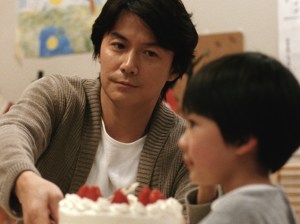 baby named Ryusei.
baby named Ryusei.
Noted director and festival favourite Kore-eda Hirokazu has won countless awards for his poignant, realistic social dramas. His subtle new drama deals with issues of blood, patrimony, family, children, class, names and identity. Like Father, Like Son opens today in Toronto.
I spoke with him at the Toronto International Film Festival in September, 2013.
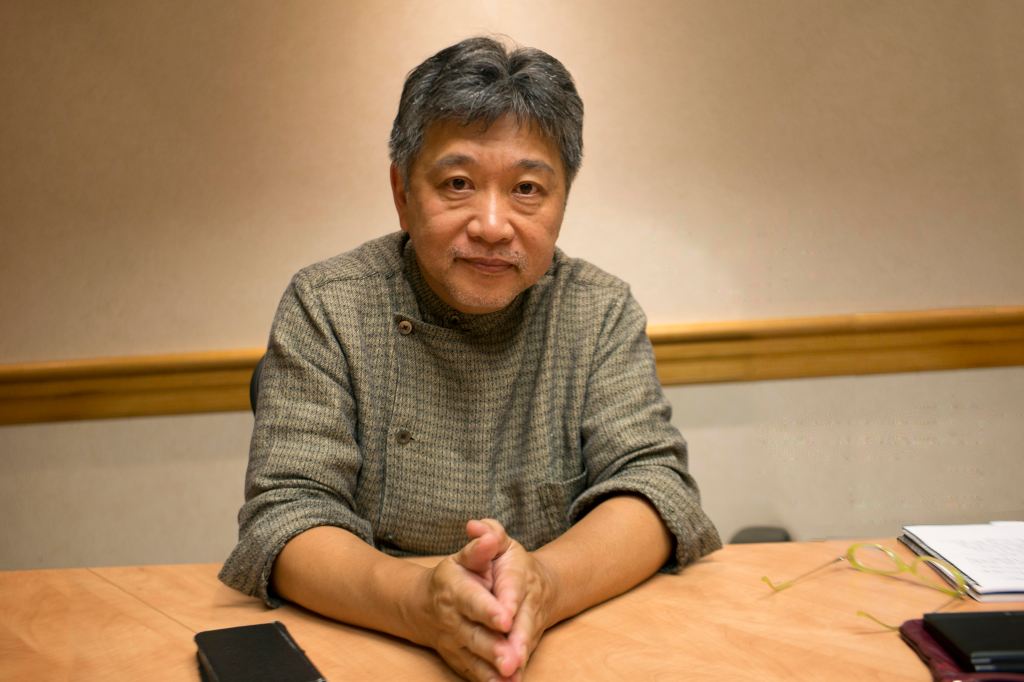


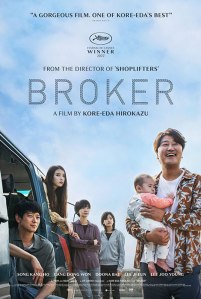


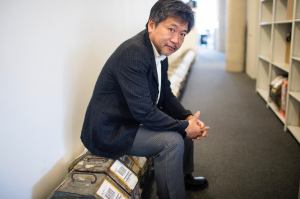
leave a comment